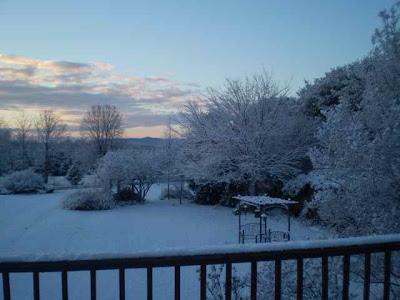Getting Piper Home
Sunday morning, I went out to feed as usual. As usual, the barn cats—Spotz, Sherman, and Twiggy—were waiting at the end of the deck to escort me down the hill. We went past the tractors, through the pines where—as usual—I heard Melody whuffling to tell me to hurry up, and along the fence. Then I heard something crying.
Within seconds, a little beagle puppy ran to me, shivering and crying. I picked her up. Oh, no, I thought, not another stray! I have too many already. Indeed, I'd already taken on a lot of strays during the last 11 years: Emma, the mixed sheltie the Mexicans couldn't take home on the bus after feeding her all summer; Hubert, the beagle I found at the creek when he was barely six weeks old; Harley the catahoula who'd marauded the neighborhood for weeks after escaping from his abusive owner; plus cats Foxy, Camilla, Eddie-Puss, Potter (who was plucked off Rt. 40 and given to me), and Olivia and Twiggy who both gifted me with kittens (which is why I have Jim-Bob, Chloe, Spotz, and Sherman). See what I mean?
But this baby beagle didn't look like the typical stray. She was too clean and—despite wolfing down some of the dog food I was taking to the kennel—too well-fed. She looked well bred, too. She couldn't have been more than three months old.
She had to belong to someone. But who? And how had she ended up at my place?
Anyhow, I took her back to the house and let her walk along with me and Emma as we did our morning constitutional.
The puppy stuck close to us and showed no sign of wanting to run off. After the walk, I took her inside and considered my options. First I called a guy down the road who raises beagles to see if one of his had escaped. He didn't have any puppies under a year old. Then I e-mailed Claudia, who lives a mile away as the crow flies, to see if she knew anyone missing a puppy. Then I posted on Facebook for ideas. I figured I'd call some county veterinarians the next morning and maybe the animal shelter to see if anyone had reported the puppy missing. Finally, I started making some "Found Beagle" signs. I posted two down at the intersection in case the pup's owners came along. I asked my closest neighbor if he knew of anyone missing a puppy. He didn't.
While the pup napped, I did some household chores and made up a few more posters. I figured I'd put them on the bulletin boards at some of the local convenience stores. I copied this picture onto my "Found Beagle" poster:
Not a great picture, but it showed the pup's markings. I added my phone number and headed for the Penhook Minute Market, two miles away. On the way, I saw a couple of women walking a dog. I stopped, showed them my poster, and asked them if they knew of anyone who lost a little beagle. They didn't.
I was getting discouraged, but maybe someone would see my poster and recognize the pup. I pulled into a parking space almost directly in front of the bulletin board. That's when I saw this:
I compared pictures. The same puppy! I snatched the poster off the bulletin board. When I got home, I called the number (Note: I've removed part of it from the poster for privacy purposes) and gave directions to my house.
My husband and I collected the pup from the cat crate where she'd been napping and waited in the front yard.
When the puppy saw a white truck approaching, she got excited and wiggled loose from my husband's jacket. Obviously, these were her people. Soon little "Piper," who'd taken off about 6 on Saturday evening, was reunited with her family and homeward bound.


































































